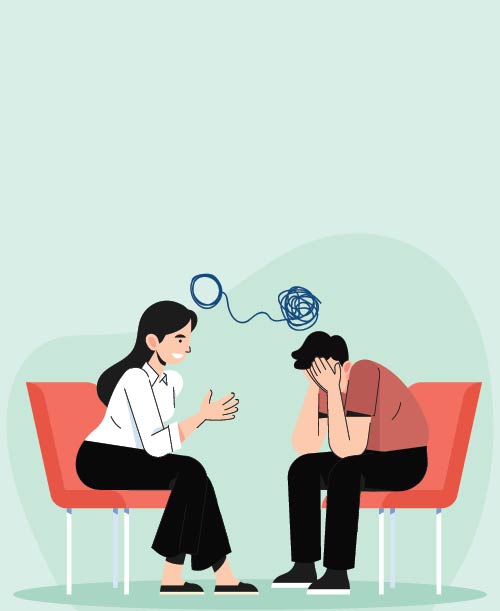Unlocking the Secrets of Mental Health And Wellness: A Summary of Therapy and Therapy Options
Mental health and wellness is a complicated and important element of general health. Various counseling and therapy alternatives exist to deal with different psychological challenges. Each approach provides distinct benefits and techniques tailored to specific demands. Understanding these options is necessary for any individual looking for to improve their mental health and wellness. Mental Health Resources. What aspects should one think about when exploring these avenues? The answer might expose a path to a healthier emotional state
Recognizing Mental Wellness and Its Value
Psychological wellness encompasses the psychological, mental, and social well-being of individuals, substantially influencing just how they think, feel, and act. Its significance can not be overstated, as it influences every element of life, consisting of connections, work efficiency, and overall lifestyle. Individuals with good mental wellness have a tendency to deal with stress and anxiety extra properly, preserve much healthier relationships, and make educated decisions. Alternatively, bad mental wellness can cause psychological distress, impaired functioning, and different mental disorders, which may call for professional treatment. Understanding psychological health is essential for recognizing the indicators of distress and the need for assistance. Awareness likewise advertises empathy and minimizes stigma, motivating people to seek assistance when necessary. By focusing on mental health and wellness, areas can foster atmospheres that support emotional health, ultimately bring about healthier, more resistant individuals. This foundation acts as an important step toward effective mental health and wellness counseling and therapy choices.
Types of Therapy Strategies
Counseling methods differ commonly, each customized to fulfill the unique demands of people looking for support. Amongst one of the most common types are cognitive-behavioral therapy (CBT), which focuses on recognizing and altering unfavorable thought patterns, and person-centered therapy, which highlights compassion and acceptance. Psychodynamic treatment explores past experiences and unconscious processes to comprehend current behavior, while solution-focused quick therapy intends to recognize solutions as opposed to examine problems.Additionally, household treatment addresses relational dynamics and interaction within family members, fostering much healthier communications. Team counseling offers a common space for individuals to share experiences and sustain one another. Other approaches include existential therapy, which motivates people to locate definition and function, and art or songs therapy, which utilizes imaginative expression as a healing device. Each technique provides distinct techniques and viewpoints, allowing customers to find the most appropriate technique for their personal growth and healing journeys.
Discovering Different Therapy Techniques
In the domain of mental wellness therapy, numerous treatment techniques supply distinctive approaches to treatment. Cognitive Behavior modification emphasizes the link between behaviors and ideas, while Psychodynamic Therapy checks out unconscious impacts on emotional health. Furthermore, Mindfulness-Based Methods promote present-moment understanding as a way to boost emotional law and general psychological health and wellness.
Cognitive Behavior Modification
Cognitive Behavioral Therapy (CBT) stands apart as one of one of the most extensively practiced and looked into modalities in psychological wellness treatment. This strategy focuses on the affiliation in between actions, feelings, and thoughts, highlighting that modifying unfavorable idea patterns can lead to boosted emotional wellness and behavioral adjustments. CBT is structured, usually including a restricted variety of sessions, and intends to outfit individuals with useful skills to manage their signs and symptoms. It is effective for a range of problems, consisting of anxiety disorders, clinical depression, and post-traumatic tension problem. By making use of strategies such as cognitive restructuring and direct exposure therapy, CBT promotes durability and equips customers to face difficulties head-on, making it a beneficial choice in the landscape of mental health and wellness therapies.
Psychodynamic Therapy Methods
Psychodynamic treatment approaches use a deep expedition of the subconscious mind and its influence on behavior and emotional well-being. Rooted in Freudian concept, these methods emphasize the significance of very early childhood years experiences and subconscious problems. Via methods such as complimentary organization, dream evaluation, and transfer, individuals get insight into their thoughts and sensations, cultivating self-awareness and understanding. This healing method encourages customers to uncover quelched feelings and unresolved problems, which can be pivotal in attending to current psychological obstacles. By examining the interaction between past experiences and existing behaviors, psychodynamic treatment aims to promote psychological healing and individual development. Ultimately, it gives a structure for people to check out complex inner dynamics that affect their psychological health and wellness.

Mindfulness-Based Methods
While typical treatments typically concentrate on previous experiences, mindfulness-based strategies focus on present-moment awareness as a pathway to emotional well-being. These methods, including mindfulness-based cognitive treatment (MBCT) and mindfulness-based anxiety reduction (MBSR), urge individuals to engage fully with their ideas and sensations without judgment. Practitioners learn to observe their frame of minds, fostering a better understanding of psychological triggers and reactions. This technique not just reduces symptoms of anxiousness and depression yet additionally enhances overall mental strength. By incorporating mindfulness workouts, such as meditation and deep breathing, customers grow a sense of tranquility and clarity. Ultimately, mindfulness-based strategies equip individuals to browse life's obstacles with enhanced awareness and click to read more approval, promoting a much healthier connection with their feelings and thoughts.
The Role of a Specialist or Therapist
An experienced therapist or therapist plays a crucial function in supporting people with their psychological wellness trips. They provide a secure, non-judgmental area where customers can reveal their feelings and thoughts openly. Couples Therapy. By using numerous restorative strategies tailored to every person's requirements, specialists help customers discover underlying issues that might add to their psychological wellness challenges.Therapists supply support and devices to deal with tension, stress and check out here anxiety, depression, and other psychological troubles. Their training furnishes them to identify patterns in behavior and thought procedures, helping with understandings that result in individual growth. They additionally foster a strong healing partnership, which is vital for effective outcomes.Moreover, therapists stay fully commited to confidentiality and ethical criteria, guaranteeing a trusting atmosphere. Ultimately, the role of a therapist or therapist is to encourage people, motivating them to create strength and much healthier coping strategies while steering through life's complexities
Just how to Pick the Right Therapy or Treatment Choice
Selecting the appropriate counseling or therapy option begins with examining specific demands. It is vital to comprehend individual obstacles and objectives before exploring numerous treatment designs. This fundamental step can greatly affect the performance of the chosen approach.
Examine Your Demands

Exactly how can individuals effectively assess their psychological health and wellness needs when reviewing therapy or treatment choices? Initially, they must assess their emotional state and determine certain concerns, such as anxiousness, anxiety, or partnership obstacles. Journaling can be a useful device for tracking ideas and sensations with time. Furthermore, people may gain from looking for feedback from trusted close friends or relative regarding viewed changes in habits or mood. It is also helpful to examine individual objectives for treatment, such as improving coping skills or browse around this web-site getting understanding right into individual patterns. Ultimately, investigating different counseling techniques and their viability for particular demands can assist in making an enlightened selection. Ultimately, self-awareness plays a critical duty in picking the appropriate path for mental health and wellness support.
Explore Treatment Styles
While going across the diverse landscape of treatment choices, individuals need to think about different styles of counseling to find the finest fit for their special needs. Cognitive Behavior Therapy (CBT) concentrates on changing adverse idea patterns, while Psychodynamic Therapy checks out subconscious processes and past experiences. Humanistic techniques emphasize individual development and self-actualization, promoting an encouraging environment. Additionally, mindfulness-based treatments cultivate present-moment understanding, helping emotional guideline. For those looking for structure, Solution-Focused Quick Therapy targets details goals and remedies. Team therapy provides a public setting for shared experiences and assistance. Ultimately, individuals ought to assess their preferences, comfort levels, and specific difficulties, ensuring they choose a healing design that resonates with their personal journey towards psychological well-being.
Getting Over Obstacles to Looking For Aid

The Advantages of Therapy and Treatment for Psychological Health
Looking for help for mental wellness challenges can result in significant enhancements in general health. Therapy and therapy give individuals with a safe space to explore their feelings and thoughts, cultivating self-awareness and personal growth. These professional services furnish clients with coping methods and problem-solving skills tailored to their unique situations.Moreover, treatment can reduce signs of anxiousness, clinical depression, and various other mental health disorders, improving emotional durability. Routine sessions promote accountability and motivate people to establish and achieve personal objectives. With different therapeutic modalities, such as cognitive-behavioral therapy or mindfulness techniques, customers learn to reframe negative thoughts and develop much healthier behaviors.Additionally, the restorative connection itself can be a resource of support, assisting to combat seclusion and loneliness. Generally, taking part in counseling and treatment is a proactive step toward achieving psychological health, enabling people to lead even more satisfying lives.
Frequently Asked Inquiries
How Lengthy Does Counseling or Treatment Commonly Last?
The duration of therapy or treatment varies considerably, frequently lasting from a few sessions to several months or years. Aspects influencing this include the individual's details demands, the kind of therapy, and therapeutic goals.
What Should I Expect Throughout My First Session?
Throughout the first session, individuals can anticipate an introduction, discussion of worries, and the therapist's strategy. They might complete evaluations and develop goals, promoting a safe atmosphere for open interaction and building relationship.

Are There Any Kind Of Risks Related To Therapy?
Therapy can include dangers, such as emotional pain, vulnerability, or confronting agonizing memories. While these challenges may occur, they can also result in individual development and healing, making the healing procedure facility yet potentially gratifying.
Exactly How Can I Tell if My Specialist Is an Excellent Fit?
Figuring out if a specialist is an excellent fit entails assessing convenience, communication style, and healing technique. Favorable connection and progress in the direction of objectives are indications of an appropriate match, necessary for efficient mental health and wellness support.
Will My Insurance Policy Cover Counseling or Therapy Sessions?
Determining insurance policy protection for counseling or treatment sessions often requires speaking to the insurance supplier directly. Policies differ significantly, so individuals need to validate benefits, co-pays, and any necessary pre-approvals before seeking treatment services. Among the most typical types are cognitive-behavioral treatment (CBT), which focuses on determining and transforming negative thought patterns, and person-centered treatment, which stresses compassion and acceptance. Psychodynamic therapy discovers unconscious procedures and past experiences to comprehend existing behavior, while solution-focused brief treatment aims to determine remedies instead than examine problems.Additionally, family therapy addresses relational characteristics and communication within family members, promoting much healthier communications. Various other techniques include existential treatment, which urges people to find significance and function, and art or music therapy, which makes use of innovative expression as a healing device. Cognitive Behavioral Treatment stresses the link in between actions and ideas, while Psychodynamic Therapy explores unconscious impacts on emotional wellness. Cognitive Behavioral Therapy (CBT) concentrates on transforming adverse idea patterns, while Psychodynamic Therapy explores unconscious processes and previous experiences.